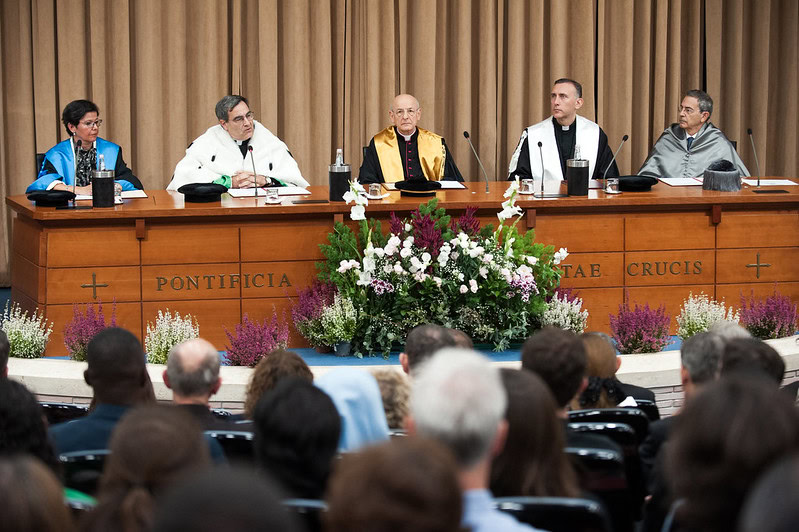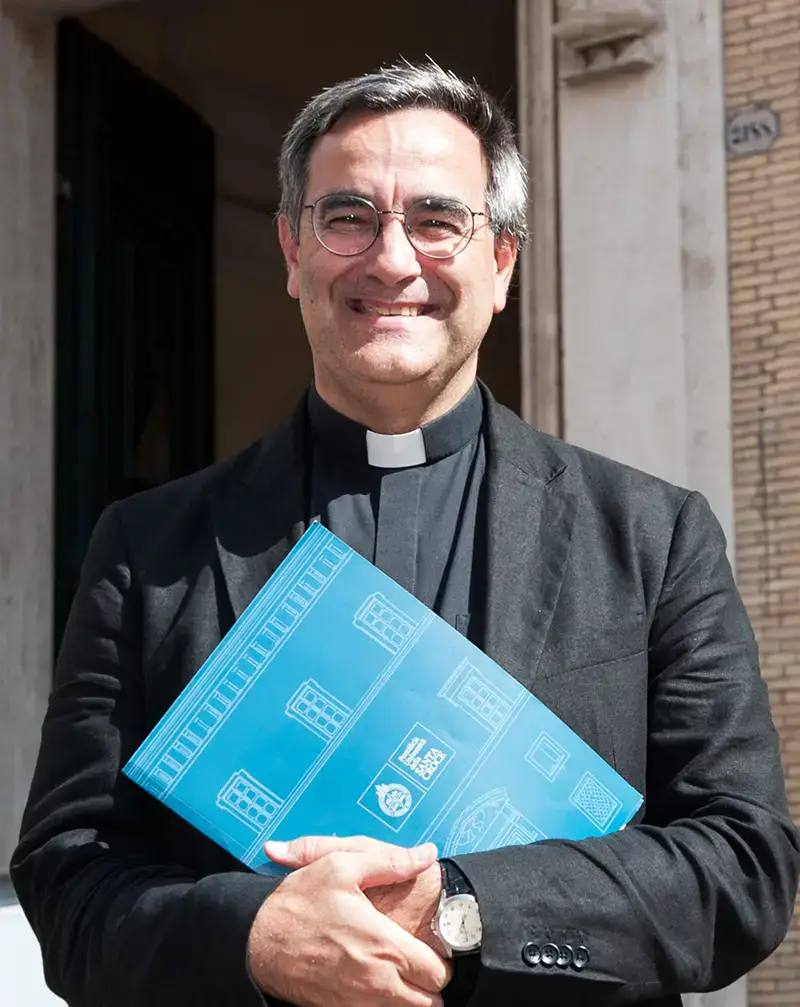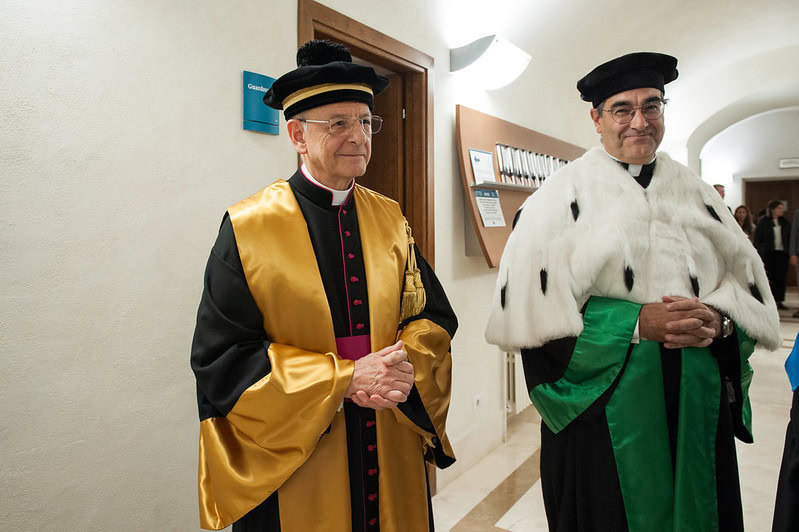
The Pontifical University of the Holy Cross celebrates 40 years of service to the Church, having trained more than 15,000 students from all over the world. Its new rector, Don Fernando Puig, highlights the achievements, challenges and its key role in evangelization.
- What are the objectives accomplished by this university in service to the Church and the Holy Father during this time?
First of all, I would like to thank the CARF Foundation - each of the people who work in the Foundation and collaborate with it - for these 40 years of help, prayers and encouragement. It may seem like a simple courtesy, but it is not. La Santa Croce exists because there are people who make it exist, from those who started it with a vision of the future and a great faith, to the seminarian or the priest who feels the need for formation in order to live his vocation and give himself to the mission in communion with his bishop.
More and more lay people are also asking us for formation because they need it for their vocation as transformers of the world. If this is so, one objective achieved is that thousands of people want Santa Croce to exist. Those of us who work in it accumulate debt upon debt.
The numbers are cold and always partial, but having welcomed 15,000 students from 1,300 different dioceses over the years and having our professors publish 1,800 books is not something that can be improvised. In any case, only at the end of the life of a student, a professor or an employee of Santa Croce will we see the extent of the evangelizing impact of his or her work.

- What are the challenges and goals you have ahead of you for the next four years?
They are not fixed, predetermined. We have our eyes wide open to the needs of evangelization. How what we do - helping to form, teaching to think, encouraging to transmit the faith - is developed without haste, calmly and with a broad perspective.
We are mindful of the example of our predecessors (some of whom are saints, perhaps those "next door" of whom the Pope speaks) and of a fundamental motto that distinguished them: work, work, work. We must be as united as possible and try to grow professionally and personally, one by one, at Santa Croce.
- Has the Pope asked you for anything concrete at the head of the PUSC?
I have not been able to greet the Pope after the appointment, but I like to imagine him as he tells us his andate avanti ("go ahead") that communicates to so many people. These words translate for me into the Duc in altum! ("out into the deep") that Jesus shouted to his own. I think they are also useful for the work in a university like ours.
- As I said in an interview Luis Navarro, former rector, the PUSC is characterized by being open to the world. How can this message be strengthened so that the service that this University performs for the universal Church is really known?
Don Luis always said that our best ambassadors are our alumni (the former students). alumni). Proof of this are the numerous priests, seminarians, religious men and women and lay people, from different parts of the world and of different charisms and congregations, who study at Santa Croce. This is so because in their real, generous and disinterested service they bring something of the university.
This does not detract from the fact that we work professionally to make our activities known, as any educational entity does. In any case, the message is strengthened by walking through it: work, work and work.
- The conference of rectors associated with CRUIPRO is a body for coordinating and promoting the common action of the Pontifical University Institutions of Rome. What is the contribution of PUSC to this body and what can Santa Croce learn from the other universities?
Three of my predecessors in the Rectorate of Santa Croce presided over CRUIPRO with dedication and drive. Our desire is to contribute loyally to an endeavor that is common, not competitive. In fact, we rectors get along well, share experiences and support each other.

- You are a professor of Church Organization and Government Law at the university. With the apostolic constitution Praedicate Evangelium On the Roman Curia, some of the changes being made may not have been widely understood. How can the rector of Santa Croce explain it to us in "headlines" and key messages for Catholics in general?
The Roman Curia is a complex institution, with a millenary history. I often jokingly say that between some unique stylistic issues that it certainly possesses and others that are attributed to it, especially in the movies, a "monster" has been generated. This is not true: helping the Pope is difficult; dealing with the changing dynamics of recent decades is putting all institutions to the test.
I have my doubts that it is really so important to understand the Roman Curia: the Church is alive in every community and in the heart of every faithful and this corresponds to the efficacy of the sacramental action of the Church in every place.
Every place (in fact, every Eucharist) is as or more central than the Roman Curia. However, the ministry of visible unity carried out by the Pope is irreplaceable and the condition of possibility of the charity of Christ: the Roman Curia is justified by this mission. Many people work in it with seriousness and abnegation.

- Among other changes, perhaps it is not being fully understood that the Pope appointed a woman religious as the first prefect of a dicastery and has now announced a woman religious as the president of the Governorate of the Vatican State. Can you explain?
As I was saying, there are elements of the Roman Curia that require specialized study. The Pope has insisted that, in conditions of equal competence, no distinction should be made between men and women in the exercise of government functions. It is normal for this to happen in practice.
There are technical questions about the holding of offices in non-ordained persons (whether women or men) that deserve a fine juridical adjustment, but it is sufficient to elaborate, if the Curia's mission of service is fulfilled.
- As I understand it, and I await your correction if I am wrong, Pope Francis has emphasized the importance of a canon law that is more pastoral, accessible and mercy-centered. Recent reforms reflect this vision, what issues are being adapted, and are the changes in the protection of minors and marriage nullity benefiting the faithful?
The two issues to which you allude are important and good steps are being taken. We must not lose sight of the fact that the service of canon law is modest in order to favor such great goods as the family and the defense of weak persons, especially if they have been harmed.
We need a lot of family apostolate, a lot of formation of people and the involvement of everyone so that we will have to resort as little as possible to sanctioning processes and processes of nullity. In the end, everything is resolved in an effort to respond to the universal call to holiness, which is not a slogan but a divine design that also challenges canonists.
Marta SantínJournalist specializing in religious information.